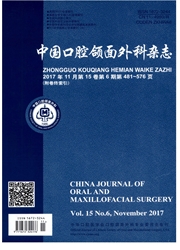

 中文摘要:
中文摘要:
目的:通过体外实验研究普通喷砂酸蚀纯钛表面和亲水性喷砂酸蚀纯钛表面对成骨细胞增殖、分化等生物学行为的影响。方法:纯钛片表面分别采用光滑处理(smooth pretreated Ti,PT)、大颗粒喷砂酸蚀表面处理(sand-blasted,large-grit,acid-etched,SLA)及亲水性化学活化大颗粒喷砂酸蚀表面处理(chemically-modified SLA,modSLA/SLActive),在表面接种MC3T3-E1成骨细胞,采用MTT、碱性磷酸酶半定量测试以及茜素红染色检测其对成骨细胞增殖、分化的影响,并采用实时荧光定量PCR检测成骨细胞在不同材料表面骨功能基因表达的差异。应用SAS 9.0软件包对数据进行统计学分析。结果:与光滑钛表面相比,普通喷砂酸蚀钛表面能通过促进ALP、钙基质的分泌和成骨功能基因(Runx2、OSX、OCN和OPN)的表达而显著抑制成骨细胞增殖并促进其分化。在表面粗糙度的基础上增加亲水性,可使这一效应更加明显。结论:表面粗糙度和亲水性是影响成骨细胞生物学行为的重要因素,粗糙钛表面能显著抑制成骨细胞增殖,促进其分化,亲水性的粗糙钛表面促进成骨细胞分化的作用更加显著。
 英文摘要:
英文摘要:
PURPOSE: To evaluate the effect of sand-blasted,large-grit,acid-etched(SLA) and chemically-modified SLA(modSLA/SLActive) titanium surfaces on MC3T3-E1 murine pre-osteoblast cell proliferation and differentiation.METHODS: Hydrophilic SLA(modSLA) surface of titanium disks were chemically-modified;sand-blasted,large-grit,acid-etched(SLA) and smooth pretreated(PT) titanium disks were produced.MTT assay,alkaline phosphatase(ALP) activity and Alizarin red-S(ARS)were used to evaluate MC3T3-E1 pre-osteoblast cell behaviors on different titanium surfaces.Real-time PCR was applied to detect the expression of osteogenic genes including Runx2,OSX,OCN and OPN of the MC3T3-E1 cells cultured on the three groups of substrates.The data was analyzed by using SAS 9.0 software package.RESULTS: ALP activities,calcium deposition and the expression of Runx2,OSX,OPN and OCN were significantly higher and the cell proliferation was significantly lower on SLA surfaces than on PT surfaces.With regard to modSLA surface,the effect was even more significant(P〈0.05).CONCLUSIONS: Surface roughness and hydrophilicity are two important factors that determine osteoblasts behaviors.Surface roughness of titanium substrates seems to enhance the osteoblastic differentiation and decrease the proliferation of MC3T3-E1 cells.Osteogenic responses to modSLA were better than to hydrophobic SLA surface.
 同期刊论文项目
同期刊论文项目
 同项目期刊论文
同项目期刊论文
 The roles of PI3K/Akt signaling pathway in regulating MC3T3-E1 preosteoblast proliferation and diffe
The roles of PI3K/Akt signaling pathway in regulating MC3T3-E1 preosteoblast proliferation and diffe The roles of extracellular signal-regulated kinase 1/2 pathway in regulating osteogenic differentiat
The roles of extracellular signal-regulated kinase 1/2 pathway in regulating osteogenic differentiat Characterization and preosteoblastic behavior of hydroxyapatite-deposited nanotube surface of titani
Characterization and preosteoblastic behavior of hydroxyapatite-deposited nanotube surface of titani Long-term outcomes of short dental implants supporting single crowns in posterior region: a clinical
Long-term outcomes of short dental implants supporting single crowns in posterior region: a clinical 期刊信息
期刊信息
